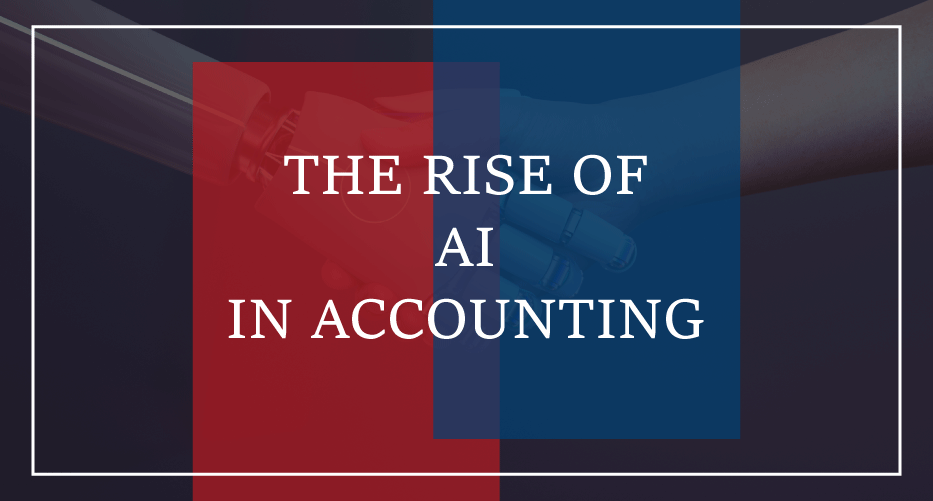AI Revolution: How Artificial Intelligence is Transforming Accounting Practices

Introduction: The AI Revolution in Accounting
The accounting industry, known for its meticulous and data-intensive processes, is undergoing a significant transformation thanks to artificial intelligence (AI). By automating repetitive tasks, improving data accuracy, and offering advanced financial insights, AI is revolutionizing how accounting professionals work. From small businesses to large corporations, organizations are increasingly adopting AI-driven solutions to enhance efficiency, reduce human error, and enable strategic financial decision-making.
The importance of adopting AI in accounting cannot be overstated. Traditional accounting practices, while reliable, often involve time-consuming manual tasks that can lead to errors. With AI, these tasks are automated, allowing accountants to focus on higher-value activities like financial analysis and business strategy. Moreover, AI offers real-time insights, allowing businesses to make data-driven decisions with unparalleled accuracy. As the AI revolution in accounting continues, businesses that integrate AI into their accounting practices are likely to gain a competitive edge.
Benefits of AI in Accounting
AI brings a wealth of benefits to the accounting industry, addressing some of the most common challenges accountants face. From automating data entry to enhancing fraud detection, AI is reshaping key accounting functions and improving overall efficiency.
Get a free consultation:
Recent post:
5 Expert Tips for Starting a Business in the UAE
Introduction to Starting a Business in the UAE: Challenges and Opportunities Starting a business in the UAE is a thrilling venture brimming with
How to Setup a Foreign Company Branch in UAE
How to Setup a Foreign Company Branch in UAE The United Arab Emirates (UAE) stands as a beacon of economic dynamism, attracting a
Data entry is one of the most time-consuming tasks in accounting. Traditional methods involve manual input of data, which can lead to errors and delays. AI-powered accounting systems, however, can automate these processes by leveraging machine learning and natural language processing (NLP). These systems can extract and input data from a variety of sources, such as invoices, receipts, and bank statements, with minimal human intervention.
By automating repetitive tasks, AI allows accountants to focus on more strategic responsibilities. This not only saves time but also reduces the risk of human error, ensuring more accurate financial records. Companies can significantly enhance their productivity by implementing AI solutions for data entry, allowing their accounting teams to allocate resources more effectively.
Fraud detection and risk management are critical components of accounting, especially for businesses dealing with large volumes of financial transactions. Traditional fraud detection methods often rely on manual checks, which can miss subtle patterns indicative of fraudulent behavior. AI excels in this area by using predictive analytics and pattern recognition to identify anomalies in financial data.
AI-powered systems can continuously monitor transactions in real-time, flagging suspicious activities and helping organizations mitigate potential risks. By leveraging AI for fraud detection, businesses can significantly reduce the risk of financial fraud and strengthen their overall financial security. This advanced risk management tool enhances an organization’s ability to detect fraud early, protecting their assets and reputation.
Tax compliance is a complex, ever-changing landscape. Keeping up with the latest regulations and ensuring accurate tax reporting can be challenging for businesses. AI offers a solution by automating tax compliance processes, ensuring that businesses remain compliant with local and international tax laws.
With AI-driven systems, companies can streamline their tax reporting processes, from calculating tax liabilities to submitting accurate reports to tax authorities. AI also reduces the likelihood of errors in tax filings, which can lead to fines and penalties. By adopting AI for tax compliance, businesses can improve their accuracy and efficiency while reducing the burden on their accounting teams.
Accurate financial forecasting is essential for businesses looking to plan for the future. Traditional forecasting methods rely on historical data and human intuition, which can lead to inaccuracies. AI, however, uses machine learning algorithms to analyze vast amounts of financial data, identifying patterns and trends that might not be visible to the human eye.
AI-powered financial forecasting tools can provide businesses with real-time insights into future cash flows, expenses, and revenues. These insights allow companies to make more informed decisions about budgeting, investments, and expansion. By incorporating AI for financial forecasting, businesses can enhance their ability to predict financial outcomes with greater precision.
Challenges of Implementing AI in Accounting
While the benefits of AI in accounting are clear, the path to AI adoption comes with its own set of challenges. From the cost of integration to training and security concerns, businesses must address these hurdles to successfully implement AI-driven accounting solutions.
The financial investment required to integrate AI into existing accounting systems can be significant, particularly for small and medium-sized businesses (SMEs). AI technologies often require substantial upfront costs for software, hardware, and implementation. Additionally, businesses must factor in ongoing costs such as system maintenance, updates, and user support.
Despite these expenses, the long-term cost savings associated with AI can offset the initial investment. By reducing labor costs, improving efficiency, and minimizing errors, AI can deliver a high return on investment (ROI) over time. Businesses must consider these long-term benefits when evaluating the cost of AI integration.
Implementing AI in accounting requires a skilled workforce capable of working with advanced technologies. This often necessitates upskilling current employees or hiring new talent with expertise in AI, data analytics, and machine learning. Training programs are essential to ensure that accounting professionals can effectively use AI tools and understand the insights generated by these systems.
Businesses should invest in continuous learning and development programs to keep their teams up to date with the latest advancements in AI. By fostering a culture of innovation and learning, companies can maximize the value of their AI investments
One of the biggest concerns surrounding AI adoption is data privacy and security. AI systems often handle sensitive financial data, making them attractive targets for cyberattacks. Businesses must ensure that their AI solutions have robust security measures in place to protect against breaches.
Compliance with data protection regulations, such as the General Data Protection Regulation (GDPR), is critical when implementing AI in accounting. Companies must prioritize security by adopting encryption, firewalls, and other cybersecurity measures to safeguard financial data. Addressing these security concerns will help build trust in AI technologies and promote their widespread adoption
The Future of AI in Accounting
As AI technology continues to advance, its role in accounting will only grow more significant. The future of AI in accounting is poised to bring even more sophisticated tools and capabilities, driving the industry toward greater automation and innovation.
How AI Software Transforms Key Accounting Functions
Artificial intelligence has redefined core accounting processes, delivering unprecedented efficiency and accuracy. From automating data entry to enhancing fraud detection, AI-powered software is revolutionizing the accounting landscape, making it essential for businesses to explore these tools for better financial management.
AI-Powered Accounting Software: Key Players and Tools
In the realm of accounting, a number of AI-powered tools have emerged, offering automation, predictive analytics, and error reduction. Here’s a closer look at some of the leading AI accounting software that businesses can leverage for more efficient workflows:
- 1
Xero: A cloud-based platform integrating AI to automate invoicing, payroll, and financial reporting. Xero’s smart reconciliation and machine learning capabilities make financial management effortless for businesses of all sizes.
- 2
QuickBooks Online: One of the most well-known accounting tools, QuickBooks uses AI to simplify expenses tracking, invoicing, and forecasting. Its AI-powered insights offer recommendations to optimize cash flow.
- 3
Sage Intacct: This platform is designed for larger organizations, offering AI-driven financial reporting and real-time analytics. Sage Intacct also integrates AI for automated compliance and cost control.
- 4
Zoho Books: Ideal for SMEs, Zoho Books employs AI for invoice automation, tax filing, and compliance reporting. It helps businesses maintain real-time financial visibility with minimal manual intervention.
These key players in AI accounting offer solutions that enhance operational efficiency, minimize human error, and improve overall financial performance.
Comparing AI Software vs. Traditional Accounting Systems
When comparing AI accounting software to traditional systems, several key advantages emerge, particularly in terms of accuracy, efficiency, and cost savings:
| Feature | AI- Powered Accounting Services | Traditional Accounting Systems |
|---|---|---|
| Efficiency | Automates repetitive tasks, real-time data process | Manual processes, time-consuming |
| Accuracy | Reduces human error through AI-driven precision | Prone to data entry errors and oversight |
| Cost Saving | Saves on labor costs, faster turnaround times | Higher operational costs due to manual labor |
| Fraud Detection | Continuous monitoring, predictive analytics for anomalies | Manual checks, higher risk of missed fraud |
| Tax Compliance | Automated updates to changing regulations | Requires regular manual updates |
AI software surpasses traditional systems in every category, offering businesses a powerful tool to streamline accounting, reduce costs, and ensure financial compliance. As a result, AI-powered systems are becoming the go-to choice for businesses seeking to improve financial management processes and outcomes.
AI Accounting in Action: Real-Life Use Cases
AI is no longer just a futuristic concept—it is already making a significant impact in the accounting world. Businesses across various industries are leveraging AI to optimize their financial processes, improve reporting accuracy, and reduce risks like fraud.
Success Stories from Companies Using AI for Accounting
Numerous companies have embraced AI accounting solutions with remarkable results:
These companies demonstrate the transformative power of AI, from audit automation to tax compliance, showcasing its ability to significantly boost operational efficiency and cut costs.
Case Study: AI for Fraud Detection in Financial Institutions
Large financial institutions face heightened risks of fraud due to the volume and complexity of transactions they process daily. One of the most impactful areas where AI is making a difference is fraud detection.
For example, a leading international bank deployed an AI-based fraud detection system capable of analyzing thousands of transactions per second. The system, using machine learning algorithms, flagged irregular patterns that human auditors had previously missed. Within the first year, this bank reduced fraudulent activity by 40%, saving millions in lost revenue. AI-driven systems not only identified fraud in real time but also provided insights into potential vulnerabilities within the bank’s existing systems, allowing for better risk management.
This case study highlights how AI-powered fraud detection can drastically improve security in financial institutions, enabling them to take proactive measures against emerging threats.
Tips for Small and Medium-Sized Businesses to Integrate AI into Accounting Workflows
Start Small: SMEs can begin by implementing AI for simple tasks, such as automating invoicing or payroll, before moving on to more complex processes like forecasting and analytics.
Leverage Cloud Solutions: Cloud-based AI accounting tools offer affordability and scalability, allowing SMEs to adopt AI without significant upfront costs.
Partner with AI Experts: Collaborating with experts in AI technology can ensure a smoother transition and help maximize the benefits of AI for your business.
By taking these practical steps, businesses of all sizes can begin to reap the benefits of AI, improving efficiency and accuracy across their accounting operation
Overcoming Barriers to AI Adoption in Accounting
While AI offers clear benefits, many businesses still face challenges when it comes to integrating AI into their accounting processes. By taking a strategic approach, organizations can successfully navigate these barriers and enjoy the advantages AI provides.
Practical Steps for Implementing AI Successfully
- 1
Assess Needs and Goals: Start by evaluating your accounting needs and determining the specific areas where AI can bring the most value, such as automation or reporting.
- 2
Select the Right Tools: Choose AI-powered software that aligns with your business size, complexity, and industry requirements. It’s critical to select tools that offer seamless integration with your existing systems.
- 3
Upskill Your Team: Provide your accounting team with the necessary training to work with AI tools effectively. This might involve hiring external consultants or offering in-house training on AI usage.
- 4
Monitor and Optimize: Implementing AI is an ongoing process. Regularly assess performance, address issues, and optimize your systems to ensure continued improvement.



